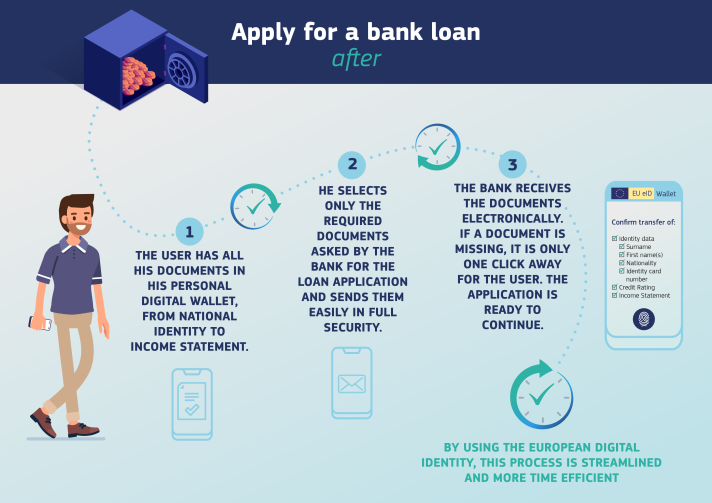The European Union’s (EU) vision for the digital transformation of our societies and economy is based on several key principles, including digital sovereignty, respect for fundamental rights, the rule of law and democracy, inclusion, accessibility, equality, sustainability, and respect for everyone’s rights and aspirations.
Designed to uphold these principles by providing users with control and privacy over their personal information, the EUDI wallet will minimize the amount of data that is collected and shared, only used for the purposes that users have explicitly consented to. Users will also be able to see who has access to their data and for what purpose, as well as to revoke their consent at any time.
The EUDI wallet is a radical shift in the way that digital identity and authentication are handled. It is a decentralized, user-centric, and individually controlled model that puts the power in the hands of the user. This is a significant step forward in the fight for digital rights and privacy.
Illustration 1
Source: EUDI Wallet: Illustration of the eIDAS roles and functions | by Lissi | Medium
EU Commission Allocates €46 Million to EUDI Pilots
Preparations for the launch of the European Digital Identity Wallet (EUDI) are intensifying, with Robert Viola from the European Commission announcing at the Digital Assembly 2023 event in Stockholm on 16 June that its technical specifications will be released shortly.
“We already published the first version of the wallet on the Github developer site,” Viola declared, adding that the architecture and software platform for the wallet would be revealed “very soon.” The conference was attended by representatives from Sweden and Ukraine, as well as from organizations like Amadeus IT Group, Yubico, and the Deutsche Sparkassen-und Giroverband association.
The EUDI is open source, and thus open to varied service providers, and may lead to the development of new methods of conducting business, according to Viola. In May, the European Commission allocated €46 million (approximately US$49 million) to four EUDI pilots, which will involve more than 250 organisations from both the private and public sector.
A shared toolbox containing architecture, reference framework, recommended standards, specifications, guidelines, and best practices is being composed by EU body states and the Commission.
In February, the first version of the Architecture Reference Framework (ARF) was released, which conveys standards and specifications for an interoperable EUDI wallet. In the study by the European Union Agency for Cybersecurity (ENISA) in 2022, they pinpointed considerable gaps in EU wallet standardization.
In April, Security Expert Senior Sławomir Górniak from ENISA at GlobalPlatform’s eID Wallet in Brussels talked about the possible cybersecurity certification process engaging the EUCC (Common Criteria-based European Cybersecurity Certification Scheme, created under the Cybersecurity Act).
Additional requirements not encompassed by the EUCC could be addressed by the ISO/IEC 17065 and the ISO/IEC 17065 framework. Thales CTO Benoît Jouffrey also suggested at the event that the GlobalPlatform certification ecosystem may assist in certifying EUDI wallets, which sets technical standards for smart cards, smartphones, wearables, and other connected gadgets.
The EUDI Wallet: Will it Transform the Financial Service Industry?
Identity is the foundation of financial services. It is used to verify customers’ identities, prevent fraud, and to comply with regulations. However, traditional methods of identity verification can be complex, costly, and time-consuming.
The EU Digital Identity Wallet (EUDI Wallet) is a new way to identify yourself for financial services – an electronic identification means with a high level of assurance that can be used to verify your identity online, across borders, and in a seamless way. It can help financial institutions reduce costs and improve efficiency, while complying with regulations. eIDAS 2.0 highlights that the financial services sector should accept the use of EUDI Wallet for the provision of services where strong customer authentication for online identification is required by national or EU law or by contractual obligations.
Illustration 2

Source: European Commission – European Union
In addition to digital identity, through the EUDI Wallet, banks will be able to use other credentials (electronic attestation of attributes) with legal value issued by trust service providers or other banks. For example, banks could use the EUDI Wallet to store information about a customer’s creditworthiness, fraud profile, or income/financial transaction data. This would make it easier for banks to assess a customer’s risk and to provide them with the right financial products and services.
The EUDI Wallet is a promising new technology that has the potential to revolutionize the way we identify ourselves for financial services. It is a more secure, efficient, and convenient way to verify our identities. It can also help financial institutions to comply with regulations and to provide better customer service.
Here are some of the benefits of the EUDI Wallet for financial institutions:
Reduced costs: The EUDI Wallet can help financial institutions to reduce the costs associated with traditional methods of identity verification. This is because the EUDI Wallet is a digital solution that can be used online, across borders, and in a seamless way.
Improved efficiency: The EUDI Wallet can help financial institutions to improve efficiency by streamlining the customer onboarding process. This is because the EUDI Wallet can be used to verify a customer’s identity quickly and easily.
Enhanced compliance: The EUDI Wallet can help financial institutions to comply with regulations by providing a secure and reliable way to verify customer identities.
Enhanced customer experience: The EUDI Wallet can help financial institutions to enhance the customer experience by providing a more convenient and secure way to verify identities.
The EUDI Wallet is still in development, but it has the potential to revolutionize the way we identify ourselves for financial services. It is a more secure, efficient, and convenient way to verify our identities. It can also help financial institutions to comply with regulations and to provide better customer service.

